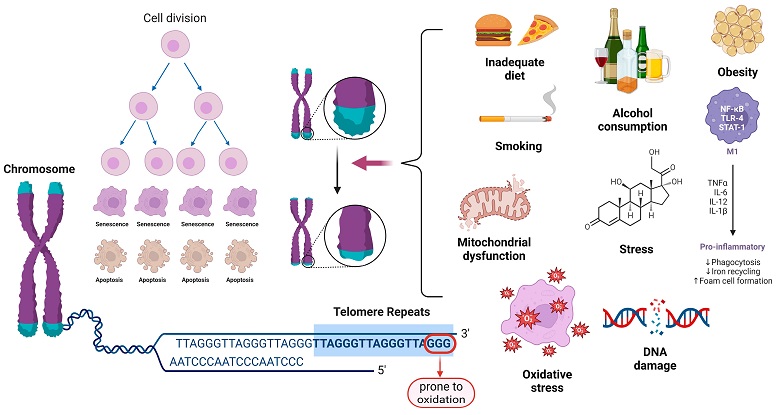New insights into the positive effects of certain medications on Telomere length
Nikhil Prasad Fact checked by:Thailand Medical News Team Jul 14, 2024 8 months, 4 weeks, 2 days, 36 minutes ago
Anti-Aging News: Scientists have uncovered groundbreaking evidence suggesting that certain medications can positively impact telomere length, potentially slowing the aging process and reducing the risk of chronic diseases. This
Anti-Aging News report dives into the exciting findings from a recent study, offering a glimpse into how pharmacologically active substances could be the key to maintaining youthful cells.
 Physiological, lifestyle, and environmental causes contributing to Telomere Length shortening. Legend: IL-6 - interleukin 6; IL-12 - interleukin 12; IL-1β - interleukin 1β; TNFα - tumour necrosis factor alpha; DNA - deoxyribonucleic acid; ↓ - decrease; ↑ - increase.
Understanding Telomeres and Aging
Physiological, lifestyle, and environmental causes contributing to Telomere Length shortening. Legend: IL-6 - interleukin 6; IL-12 - interleukin 12; IL-1β - interleukin 1β; TNFα - tumour necrosis factor alpha; DNA - deoxyribonucleic acid; ↓ - decrease; ↑ - increase.
Understanding Telomeres and Aging
Telomeres are specialized structures at the ends of chromosomes, acting as protective caps that prevent DNA degradation and ensure genomic integrity. Think of them as the plastic tips at the end of shoelaces that keep them from fraying. Telomere length (TL) is a critical factor in cellular aging and disease progression. As cells divide, telomeres naturally shorten, leading to cellular aging and dysfunction. Certain medications can influence TL and potentially reverse or slow down this process.
Key Findings from the Study
Researchers from the Carol Davila University of Medicine and Pharmacy-Romania, the University of Crete-Greece, and the University of Medicine and Pharmacy of Craiova-Romania have conducted a comprehensive review of how various pharmacologically active substances affect telomere biology.
Medications and Their Impact on Telomeres
-Statins
Statins, commonly used to lower cholesterol, have shown potential in preventing telomere shortening. These drugs are believed to reduce oxidative stress and inflammation, which are significant contributors to telomere erosion. Statins' antioxidant properties and their ability to stabilize telomeric structures make them promising candidates for telomere protection.
-Calcium Channel Blockers (CCB)
CCBs, used primarily for managing hypertension, also exhibit protective effects on telomeres. These drugs enhance endothelial function and reduce oxidative stress, thereby slowing down the telomere shortening process. Studies have shown that patients on CCB therapy had improved biological markers of aging compared to those not on these medications.
-Agents Acting on the Renin-Angiotensin System (RAS)
Medications such as angiotensin-converting enzyme inhibitors (ACEi) and angiotensin II receptor blockers (ARB) play a crucial role in managing hypertension and cardiovascular diseases. These drugs have been found to protect telomeres by reducing oxidative stress and inflammation. ACEi, in particular, offers additional vascular protection by increasing the tissue concentration of bradykinin, which has antioxidant properties.
Pharmacologically Active Sub
stances Used in Diabetes Management
-Biguanides (Metformin)
Metformin, a first-line treatment for type 2 diabetes, has shown promising anti-aging effects. It promotes insulin sensitivity and activates pathways that reduce oxidative stress and inflammation. By enhancing the activity of telomerase and protecting against DNA damage, metformin helps maintain telomere length.
-Dipeptidyl Peptidase-4 Inhibitors (DPP-4i)
These drugs, used to manage blood sugar levels in diabetes, also exhibit protective effects on telomeres. Studies have indicated that combining DPP-4 inhibitors with metformin can significantly increase telomerase activity, thus providing additional benefits in maintaining telomere length.
Drugs that have an impact on the Central Nervous System
-Antipsychotics
Antipsychotic medications, particularly atypical antipsychotics like clozapine and aripiprazole, have been shown to protect telomeres by reducing oxidative stress. These drugs offer neuroprotective benefits and help maintain telomere length, which is crucial for brain health.
Melatonin
Melatonin, a hormone produced by the pineal gland, is well-known for its role in regulating sleep. Recent studies suggest that melatonin supplementation can protect telomeres by reducing oxidative stress and enhancing DNA repair mechanisms. This hormone's anti-inflammatory and antioxidant properties make it a promising candidate for telomere maintenance.
Hormone Replacement Therapy
Hormone replacement therapy (HRT), particularly estrogen therapy, has been found to positively impact telomere length. Estrogen helps maintain telomere integrity by enhancing the activity of telomerase and reducing oxidative stress. This therapy could potentially slow down the cellular aging process, particularly in women undergoing menopause.
Danazol and Telomere Length
Danazol, a medication used to treat endometriosis and other conditions, has shown remarkable potential in increasing telomere length. Clinical studies have demonstrated that long-term danazol therapy can significantly enhance telomere length, providing a new avenue for anti-aging treatments.
Probiotics and Gut Health
Emerging evidence suggests a strong link between gut health and telomere length. Probiotics, beneficial bacteria that promote a healthy gut microbiome, have been shown to reduce inflammation and oxidative stress, thereby protecting telomeres. Regular consumption of probiotics could contribute to better cellular health and longevity.
Conclusion
The findings from this comprehensive review highlight the potential of various pharmacologically active substances in protecting telomeres and slowing the aging process. By targeting oxidative stress, inflammation, and enhancing telomerase activity, these medications offer promising strategies for maintaining youthful cells and preventing age-related diseases.
The study findings were published in the peer-reviewed journal: International Journal of Molecular Sciences.
https://www.mdpi.com/1422-0067/25/14/7694
For the latest
Anti-Aging News, keep on logging to Thailand Medical News.
Read Also:
https://www.thailandmedical.news/news/breaking-study-discovers-sars-cov-2-could-be-carcinogenic-as-it-causes-mutagenesis,-telomere-dysregulation-and-impairs-dna-mismatch-repair
https://www.thailandmedical.news/news/breaking-university-of-vermont-scientists-confirms-that-sars-cov-2-has-ability-to-damage-human-dna-and-telomeres-causing-long-covid-issues
 Physiological, lifestyle, and environmental causes contributing to Telomere Length shortening. Legend: IL-6 - interleukin 6; IL-12 - interleukin 12; IL-1β - interleukin 1β; TNFα - tumour necrosis factor alpha; DNA - deoxyribonucleic acid; ↓ - decrease; ↑ - increase.
Physiological, lifestyle, and environmental causes contributing to Telomere Length shortening. Legend: IL-6 - interleukin 6; IL-12 - interleukin 12; IL-1β - interleukin 1β; TNFα - tumour necrosis factor alpha; DNA - deoxyribonucleic acid; ↓ - decrease; ↑ - increase.